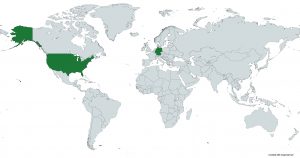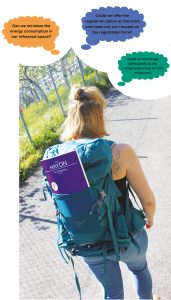Flannery Ryan, culture manager, Germany/USA
2016, 2020, 2019, 2015, 2017, 2018, 2014, 2010, 2013 and 2005. Those are the top 10 warmest years ever recorded on Earth, according to the latest report by the US National Oceanic and Atmospheric Administration. Consider the increasing number of floods, storms, fires, the loss of insects and other natural disasters on earth and it’s no wonder that in 2019 the world was taken by storm by the Fridays for Future demonstrations and the many other activities promoting a change in the way we live, consume and treat the planet we live on.
In light of all of these events, we as choir singers, organisations and (inter)national choir festival managers also need to take a step back and think of ways we can improve our rehearsals, tours and events. In 2019 the European Choral Association (ECA), on whose ideas this article is based, started this process, but it isn’t over yet. No-one is perfect or knows all the answers. So this article can’t offer you an official position, but would like to offer some food for thought and start a discussion in the choral community: What are the questions the associations need to face up to? What are the possible consequences of new measures? Which sources of information can be helpful for this discussion?
Keeping the balance: Social needs and Sustainable Goals
But before we go into the practical questions for choirs, we need to have a quick look at the events of 2020: Just like the natural disasters mentioned above, it’s possible that Covid-19 is a result of environmental issues and thus one more reason why we need to change our behaviours. But Covid-19 also showed us how much we also need human interaction and creative activities, such as singing together, to stay mentally healthy and healthy as a society. When looking at the following measures it is therefore important to keep the balance between social needs and sustainable goals in mind. Are we willing to give up travelling to distant places completely or could we justify one journey now and again to foster multicultural understanding and friendships? Should the travel emissions be the main focus of our discussions or could we also create positive change by focusing on other aspects of sustainability? Could online meetings become a complete replacement for physical meetings or do we need that time to connect with people in rehearsal and conference breaks?
Ideas for Individuals and Choirs
When an issue is so global, we as individuals sometimes get the feeling that there isn’t much we can do to help the environment. But as Greta Thunberg has shown, it only needs one person to speak up, and we as singers definitely know how to use our voices! So why not use the community of our choirs and the creative environment of our concerts to speak up and raise awareness? There is already a big repertoire of songs out there that can be used in a concert (http://icb.ifcm.net/sing/). Why not turn one of your next performances into a charity or benefit concert and donate the revenues to an organisation that helps to protect our earth? Or, if you would like to be even more involved, your choir could even consider joining a Fridays for Future demonstration and prepare a few songs that you could sing while you’re there?
But sustainability can also start in the rehearsal room. Can we minimise the energy consumption in our rehearsal spaces? Can we use reusable bottles or coffee cups in rehearsals and breaks? When bringing food to rehearsals, can we prepare something at home instead of grabbing a pre-made, plastic-wrapped snack at the supermarket beforehand? When thinking of the next choir tour, is it possible to plan the trip via train or bus? Are we willing to completely abstain from choir tours to countries that can only be reached by plane? Are all of these goals compatible with the general goals of our choirs and of ourselves?
Ideas for associations and (inter)national festivals
Choirs and individuals can demand change and make a few changes by themselves, but associations and festival managers have a growing responsibility to think about these issues and make changes to their programmes. Festivals, competitions and other big choir events are places where a lot of people come together and create a large amount of waste, as well as consume a lot of energy, food, beverages and other products. Here are some areas where changes could be made:
Catering: Can we abstain from using plastic dishes, cutlery, straws etc.? Can we abstain from using single-wrapped food and sweets? Could we ask the catering services to offer more vegetarian/flexitarian options? Or even turn things around and offer the vegetarian option as the norm and meat only per request on the registration form? Could we pay more attention to using regional products only? Is there a way to pass on food that wasn’t needed? Can we set up water fountains on site and ask people to refill their reusable bottles there?

Venues and exhibitions: When choosing our venues and rooms, can we pay more attention to ecofriendly factors (low energy consuming air conditioning systems, lighting and sound systems, etc.)? Carefully research your options: Is an app with high energy consumption really better compared to a paper version of the programme booklet or song book? Can we suggest to exhibitors at our expositions to reduce plastic or gimmicks made out of plastic and ask them to support our cause? Could we reduce the amount of office supplies we need in our daily work? Can we reuse lanyards, banners, roll-ups, bags, folders etc. for events that happen on a regular basis and thus print them without a year or date?
Transportation and getting active: Can we offer free public transportation to our events or encourage participants to arrive by eco-friendly means of transportation? Could we encourage participants to pay to offset CO2 emissions? When we as managers travel to the venues in advance, could we plan in a little more time for the trips, to travel via train or car-sharing? Could the festival itself support environmental causes, either financially or with artistic choices of concerts or festival topics?
Closing words
Scientists say we have only a few more years before we cross the threshold of dangerous and irreversible global warming. But the good news is, we still have the chance! And we can all do our part to help soften the blow. I have hope in us as a society and hope in the choral community, which has always been made up of team players. Let’s raise our voices and act!
The original hand-out, on which this article is based, is a co-compilation by Sonja Greiner, Alfred Jürgens (both from the ECA-EC office) and Flannery Ryan and is available on http://bit.ly/ECA-green-HB

 Flannery Ryan is a German-American culture manager based in Germany. Her honorary positions include board member of the European Choral Association – Europa Cantat, representative for European issues at the German Youth choir Association (Deutsche Chorjugend) and member of the working group “European Youth Policy Group” at the German Federal Youth Council, where she recently helped to write an opinion paper on the European Parliament’s guidelines on “Green Erasmus+”. She is a full-time project manager at INTERKULTUR and team coordinator for the World Choir Council. In her free time, she sings soprano in several national and international choirs, such as REVOICE International Vocal Ensemble or the singing and dancing ensemble CHOREOS.
Flannery Ryan is a German-American culture manager based in Germany. Her honorary positions include board member of the European Choral Association – Europa Cantat, representative for European issues at the German Youth choir Association (Deutsche Chorjugend) and member of the working group “European Youth Policy Group” at the German Federal Youth Council, where she recently helped to write an opinion paper on the European Parliament’s guidelines on “Green Erasmus+”. She is a full-time project manager at INTERKULTUR and team coordinator for the World Choir Council. In her free time, she sings soprano in several national and international choirs, such as REVOICE International Vocal Ensemble or the singing and dancing ensemble CHOREOS.
Edited by Bethany Farr, UK


